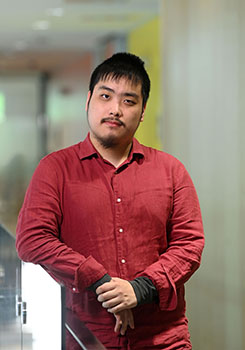This article is part of a series focusing on the grads of the ¬ť∂Ļīę√Ĺ Class of 2025. Spring Convocation takes place May 30 and from June 9-19 in Halifax and Truro. Read all our profiles¬†here in one place¬†as they are published.
When Uihyeok Jung and his family immigrated from South Korea to Canada in 2012, they settled in the small town of Trenton in northern Nova Scotia. The six years they spent there before moving to Spryfield near Halifax provided a crash course in adapting to a new culture. 
‚ÄúAs my siblings and I were among the first Korean kids to attend the local schools in Trenton, we were pretty much forced to speak and adapt to English as quickly as possible,‚ÄĚ says Jung (the name he goes by at Dal), who admits he didn‚Äôt take his English lessons seriously when living in Korea.¬†
He found ways to break through the language barriers.
‚ÄúThis was the peak of Korean culture in the West as things like Gangnam Style had just come out, so many students were interested in me and my culture!‚ÄĚ he says.¬† The popularity of Xbox gaming consoles offered another point of communication with friends and helped him to learn colloquial English.¬†¬†
Jung’s experience as a young newcomer to Canada inspired him to help other Korean immigrants by mentoring, tutoring and offering advice to students and immigrant parents keen to learn English.
This week, Jung graduates from ¬ť∂Ļīę√Ĺ with a Bachelor of Arts with Combined Honours in Sociology and History ‚ÄĒ proof of how far he‚Äôs come since first landing in Canada.¬†
Merging interests
Having spent most of his formative years in Canada, Jung’s Korean Canadian identity propelled his interest and dedication towards his research. An article he read in high school about suicides in South Korea sparked his interest in Sociology.
‚ÄúThe act of suicide ‚ÄĒ that is, to see death as preferable to living ‚ÄĒ is something that I saw as a failure, not in the person, but rather within modern society that should at its bare minimum function to maintain human life,‚ÄĚ he explains.¬†
"I wanted to at least try to understand the patterns within suicide in Asia that can perhaps answer or explain the suicide problem, which still plagues Korean society today. From there, my interest grew largely towards cultural and historical sociology, as I began to go through my sociology academic career here at Dal.‚ÄĚ
I have taken a particular interest in how the ‚Äėpast‚Äô as we understand it is interpreted within contemporary society
Jung’s interest in history stretches back to his youth. He’d read history books, textbooks, and internet forums and played history-themed video games.
‚ÄúMy choice to have History as my secondary Honours subject was in many ways to satisfy my desire to learn about the past, but also to bring in the historical method to my sociological analysis. These days, I have taken a particular interest in how the ‚Äėpast‚Äô as we understand it is interpreted within contemporary society, with my Honours project on han being a product of such interest.‚Ä̬†
A fascination is born
Jung first encountered the concept of han ‚ÄĒ a Korean social emotion associated with feelings of sadness, anger, resentment, grief, sorrow, hopelessness and hope ‚ÄĒ while working on another project. He began to wonder about the concept, and if someone like himself with few ties to Korea other than his ethnicity can also feel it.
 His research explores both how this cultural concept emerged and became accepted in Korean society and that somehow defined the Korean spirit. 
His research explores both how this cultural concept emerged and became accepted in Korean society and that somehow defined the Korean spirit. 
‚ÄúI tried to somehow combine the two subjects of my Honours degree to create what I hope is useful research on han that sees this idea beyond just ‚Äėsocial emotions,‚Äô but as a force that perpetuates social movements.‚ÄĚ
Jung says studying the mystique of Korean culture was fascinating. 
‚ÄúFrom my perspective, the term han is a cultural mystique: a concept that many from my cultural-ethnic community said was real, that ‚ÄėKoreans can understand and feel,‚Äô but uncomprehensible for a Korean Canadian like me. This genuine desire to not only learn but also try to feel this concept that I am researching made me very motivated to continue through the study.‚ÄĚ
Cultures are very complex and sometimes difficult to convey into writing
Jung says he feared misrepresenting the concept and Korean culture during his work. 
‚ÄúCultures are very complex and sometimes difficult to convey into writing, especially concepts that may not have a specific way to transfer their full meaning to English,‚ÄĚ he says. ‚ÄúThe completion of my combined Honours degree and my research in some ways has put relief in my heart that perhaps what I have been doing so far has been at least, dare I say, ‚Äėpassable,‚Äô in their representation of Asian cultures.‚Ä̬†¬†
Achievements recognized
Jung‚Äôs academic work and quality of his thesis was recognized by his profs as he was selected to win this year‚Äôs Reverend S.H. Prince Prize in Sociology, a monetary prize that is awarded by the Department of Sociology and Social Anthropology to the ‚Äúextraordinary undergraduate student‚ÄĚ who exhibits the highest level of mastery and the commitment to sociological research.
This fall, Jung will start as a fully funded student in the Master of Arts in Sociology program at the University of Toronto. He says he’s well-prepared for this venture thanks to his supportive professors at Dal.
¬†‚ÄúI hope to take what I learned from here and elsewhere from now on to hopefully work towards a career in social research, perhaps even in academia.‚ÄĚ

